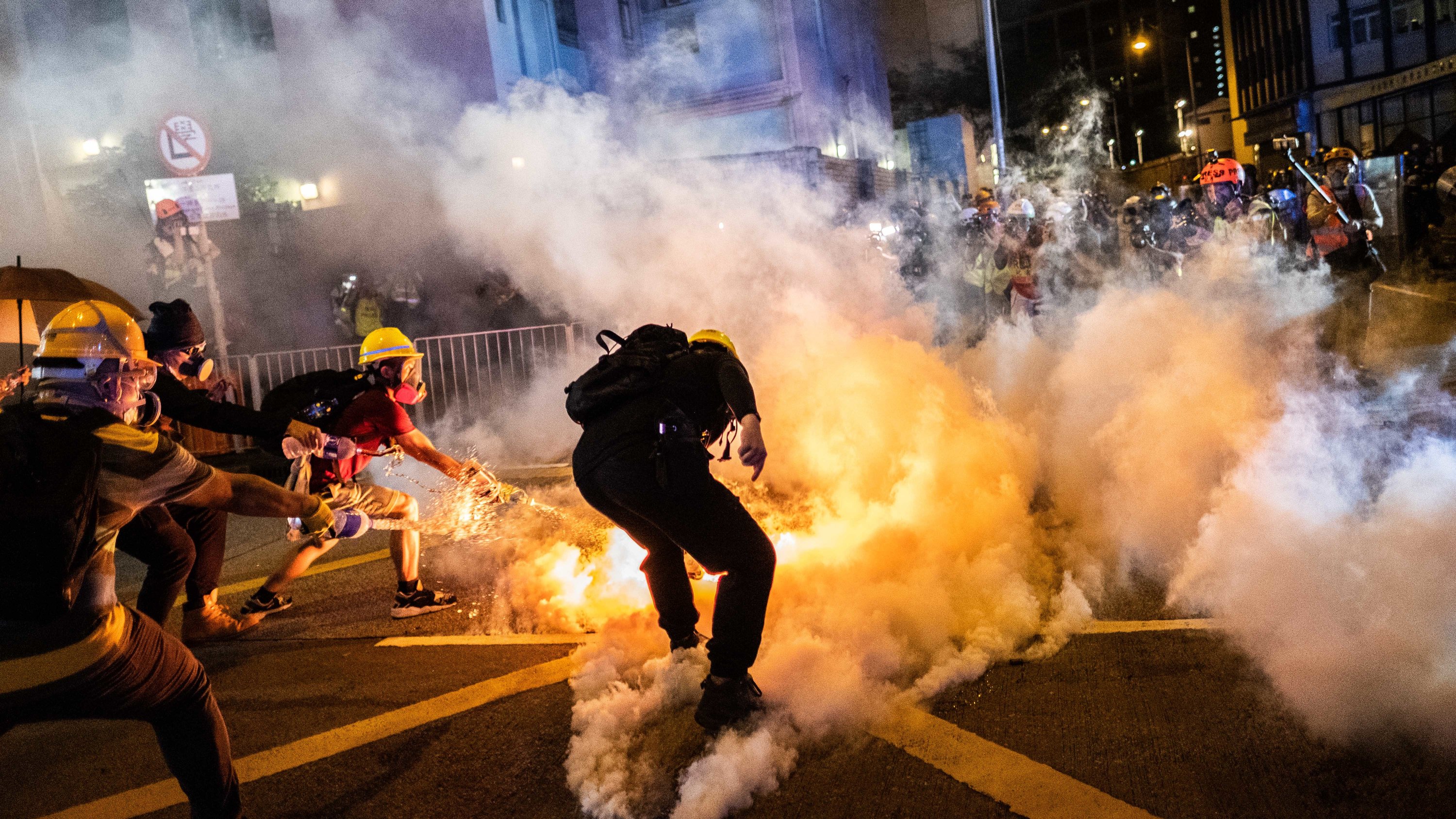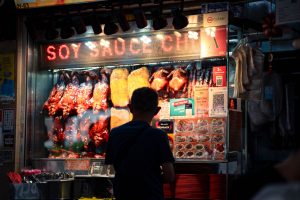In recent months, much ink has been spilled on this subject. Hong Kong-based journalists have tried to explain Singapore’s relative tranquility, while Singaporean pundits have called on Hong Kong’s protesters to stop this madness at once.
In the post-protest op-ed buffet, you can enjoy a wide selection of theories and opinions. There are editorials on why Singaporeans aren’t revolting, why Singaporeans don’t understand Hong Kong, and lengthy think pieces explaining the cultural differences between SG and HK.
However, the relentless editorialising does not seem to have made the situation any clearer. One recent post in r/Hongkong accused Singaporeans of ‘abandoning’ Hong Kong, but this narrative was hotly disputed by Singaporean Redditors. Some claimed that pro-China Facebook comments were made by ‘Zuckerbots’, while others suggested they were legitimate opinions from older Singaporeans who did not ‘understand’ the protests.
It’s all a bit confusing, so we decided to survey a total of 1055 Singapore residents with the help of independent research company, Milieu Insight.
Here’s what we learned from the survey results:
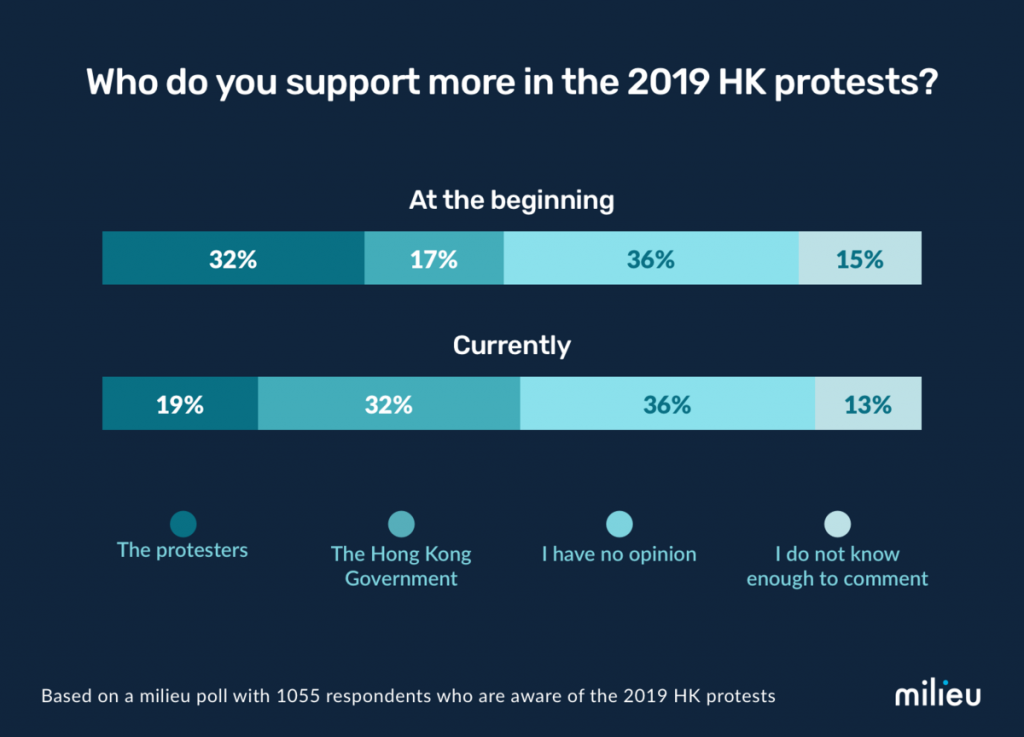
Since then, support for the protesters has fallen to just 19%. When asked ‘Who do you support more CURRENTLY in the HK protests’, less than a fifth of all Singaporeans expressed solidarity with the black-clad protesters.
Meanwhile, support for the embattered HK government has risen from 17% to, well, 32%. In the PR battle for hearts and minds, Carrie Lam and her detractors seemed to have swapped places over the last couple of months.
When we asked the ex-supporters why they no longer supported the demonstrations, 87% chose the option ‘the escalated violence is threatening the safety of the people’. 76% expressed concern for the wellbeing of Hong Kong citizens, while 70% believed that the protests have lost their original purpose.
For those who still support the protests, the problem is simpler. 82% of the pro-protest camp believe demonstrations must continue because the HK government has not done enough to address the protester’s demands.
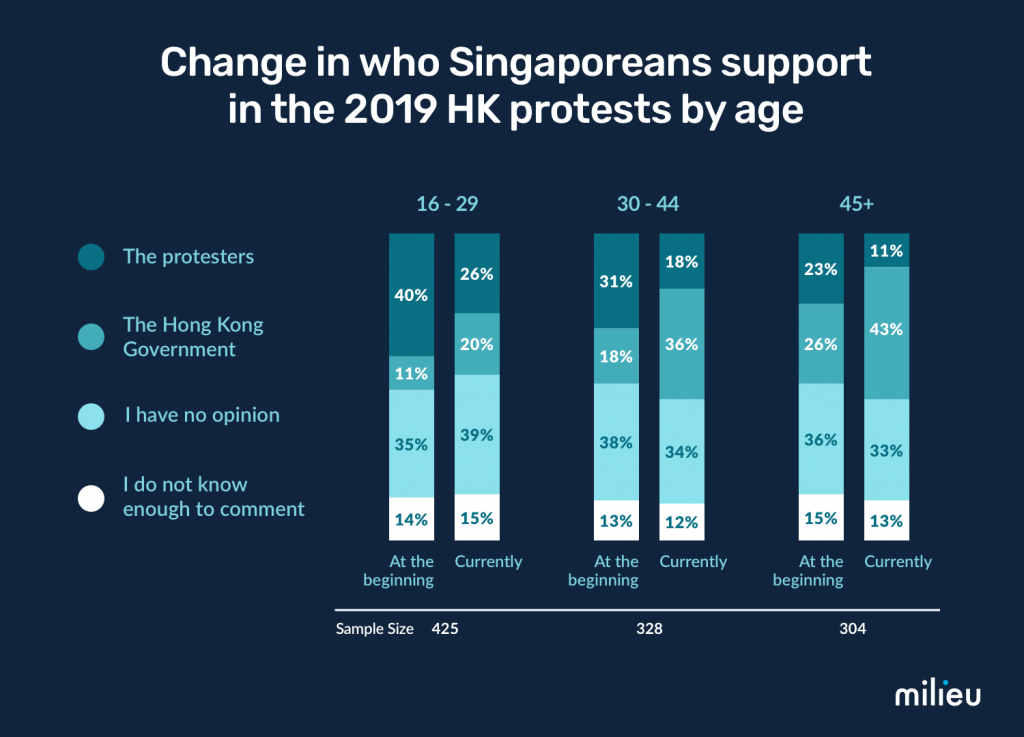
However, pro-protest sentiments have fallen across the board. In our youngest age group of 16-29 year old, support has fallen from 40 to 26%. This change in sentiment is more pronounced in older respondents. In the age group 45 years and above, pro-protest sentiments have been halved from 23% to just 11%. The majority in that age group (43%) now side with the HK government.
I’m afraid you can’t blame it on bots or China trolls. Many Singaporeans do oppose the demonstrations—in principle.
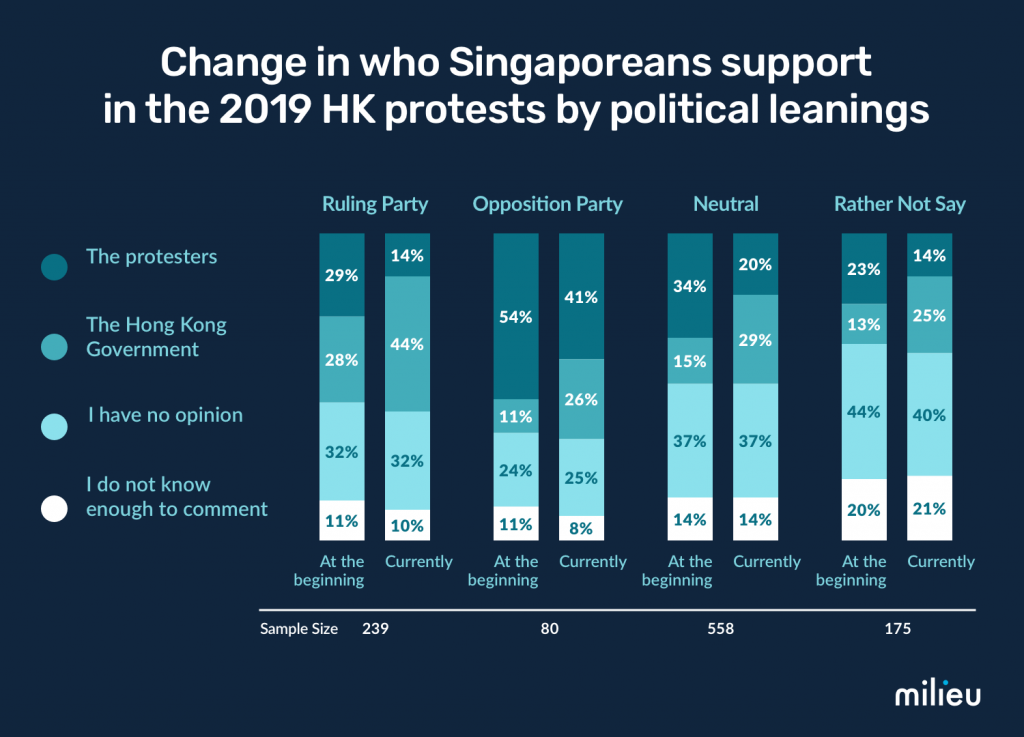
Opposition supporters showed a high degree of support for the HK protests when they first started (54%) and they continue to do so today (41%).
For PAP supporters, the situation is a little more complicated. Initially, PAP supporters were evenly split between pro-protest (29%) and pro-govt (28%). As the violence escalated, pro-protest sentiments fell to 14% while approval of the HK govt increased significantly to 44%.
I’m not sure what to make of this information, but there appears to be some truth in the cliche that incumbent voters mainly crave ‘stability’.
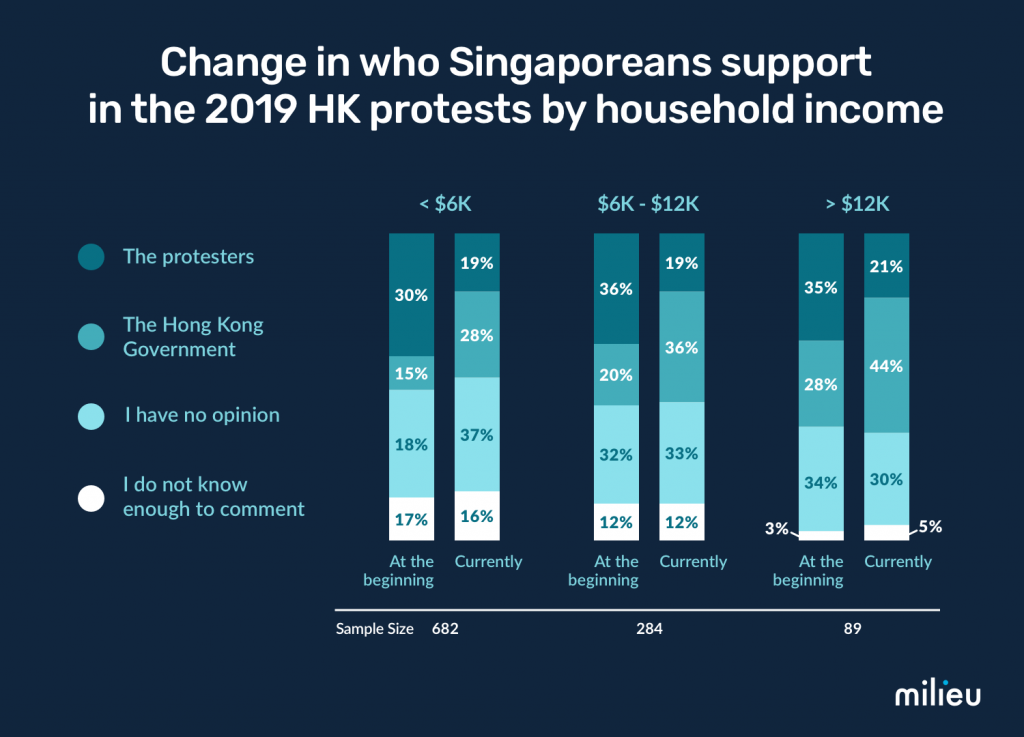
The only difference is, awareness/emotional investment seems to increase according to household income. The lowest income bracket (less than $6k) displayed the highest degree of apathy with 37-38% answering ‘I have no opinion’ to our queries. In contrast, only 30% from the highest income bracket expressed a lack of opinion.
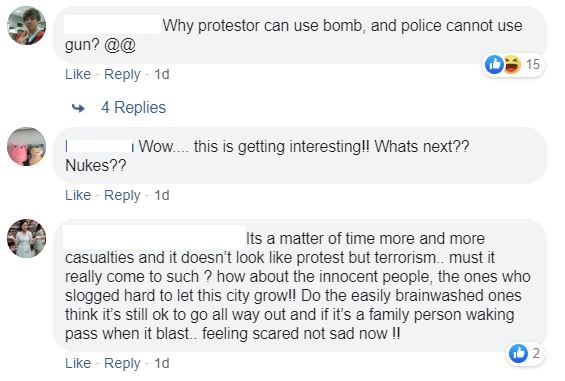
This is probably not true. In reality, most Singaporeans have a more nuanced view of the situation. 17% blamed the HK govt, 21% blame China and 24% blamed the protesters for escalating tensions. However, the clear majority of survey respondents (34%) chose the option: ‘No one party is solely responsible’. To me, this shows a certain amount of balance/measure in thinking about the Hong Kong crisis.
However, protesters who allege ‘police brutality’ will find no sympathy in S’pore. Only 4% of those surveyed blamed the violence on HK’s police force.
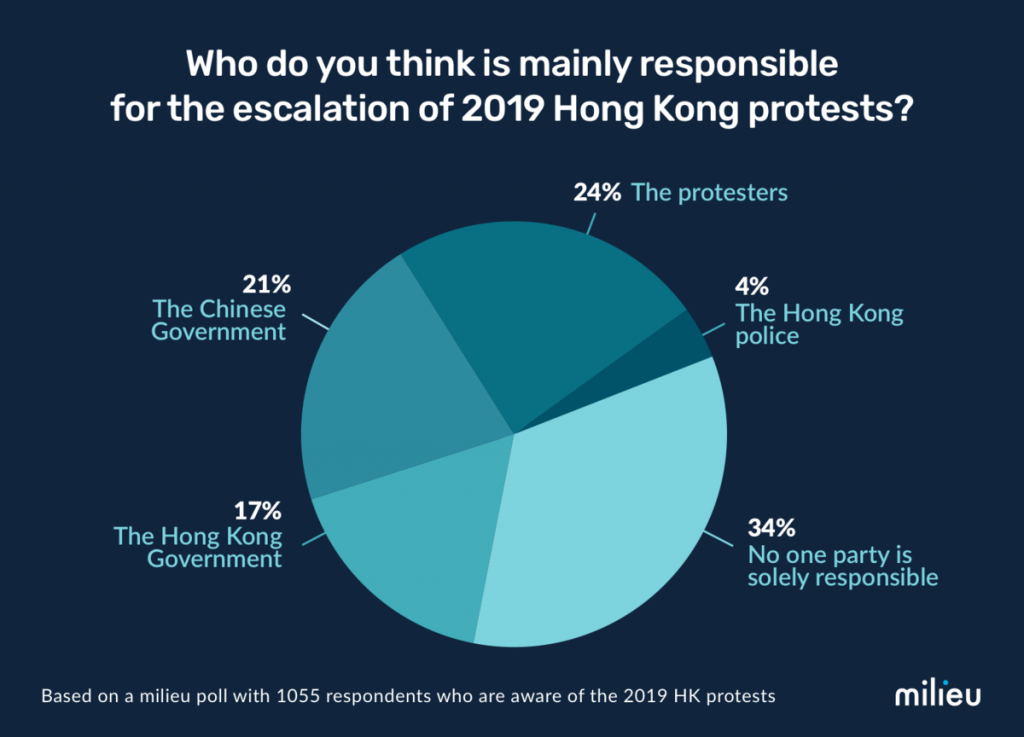
Their happiness is probably premature. Although Singapore’s support for the protests is quickly slipping away, this does not equate to commensurate increase for Beijing or its policies. Most Singaporeans have no feelings or opinions about China, but for those who do, anti-China sentiments still outnumber their pro-China counterparts.
Pro-China sentiments are in short supply especially amongst the younger population. Just 2% of those aged between 16 – 29 said they were ‘strongly in support’ of the Chinese government. This number increases to 9% if you include those who were ‘somewhat supportive’, but all in all, Beijing is doing quite poorly on the soft power front.

A significant number—13%—excused themselves by saying they did not know enough about the subject.
In contrast to the high degree of political mobilisation in HK, it seems that most Singaporeans are—true to form—quite apathetic when it comes to politics. Despite a GE around the corner and Nationalism rising around the world, a shrug of the shoulder is still our default response to the category of news broadly termed ‘current affairs’.
I could try to explain this by delivering a lecture on how authoritarian governments cultivate apathy as a means of political control, but really, what’s the point? I’ve already exceeded my word limit and I’m sure you’ve heard—lived—all the old arguments. I hope you enjoyed these statistics. They’ve certainly set my mind ablaze.
“People say nothing is impossible, but I do nothing every day”. Write to us at community@ricemedia.co.

